Object is possibly 'undefined' error in TypeScript [Solved]
Last updated: Feb 27, 2024
Reading time·5 min

# Object is possibly 'undefined' error in TypeScript
The "Object is possibly 'undefined'" error occurs when we try to access a
property on an object that may be undefined (e.g. marked as optional).
To solve the error, use optional chaining to short-circuit if the reference is
equal to null, e.g. p1?.address?.country.

Here is an example of how the error occurs.
type Person = { address?: { // 👈️ could be undefined country?: string; city?: string; }; }; const p1: Person = {}; // ⛔️ Error: Object is possibly 'undefined'.ts(2532) p1.address.country;
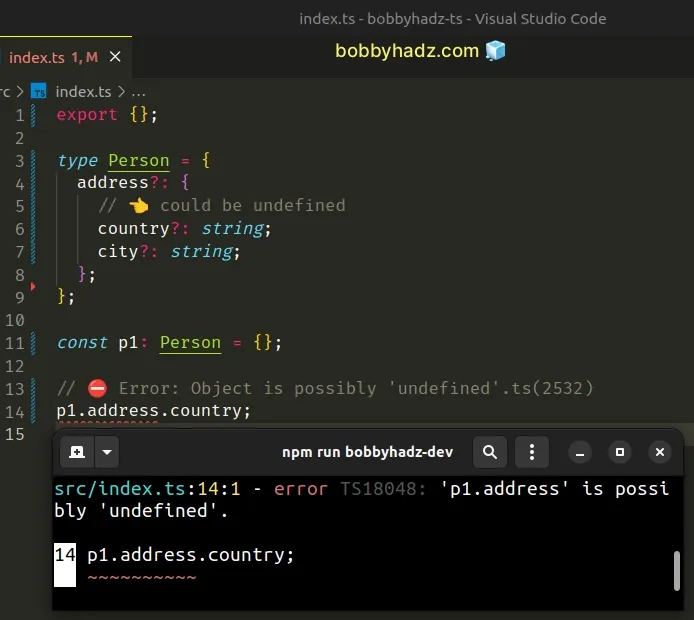
The address property on the Person type is marked as
optional,
so it might be undefined.
This is why we aren't able to safely access the country or city properties.
# Using the optional chaining (?.) operator
You can use the optional chaining (?.) operator to resolve the issue.
type Person = { address?: { country?: string; city?: string; }; }; const p1: Person = {}; // ✅ No error const result = p1?.address?.country; console.log(result); // 👉️ undefined
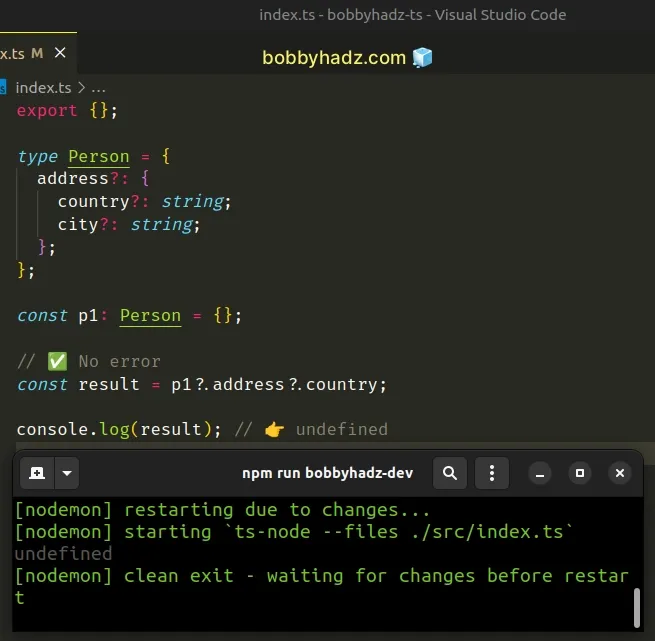
The question mark dot (?.) syntax is called optional chaining in TypeScript.
It is like using dot notation to access a nested property of an object but
instead of throwing an error if the reference is nullish (null or
undefined), it short-circuits returning undefined.
# Providing a fallback value if the property doesn't exist
You can combine the optional chaining (?.) operator with the nullish coalescing (??) operator to specify a default value if the property doesn't exist.
type Person = { address?: { // 👈️ could be undefined country?: string; city?: string; }; }; const p1: Person = {}; const result = p1?.address?.country ?? 'fallback value'; console.log(result); // 👉️ fallback value
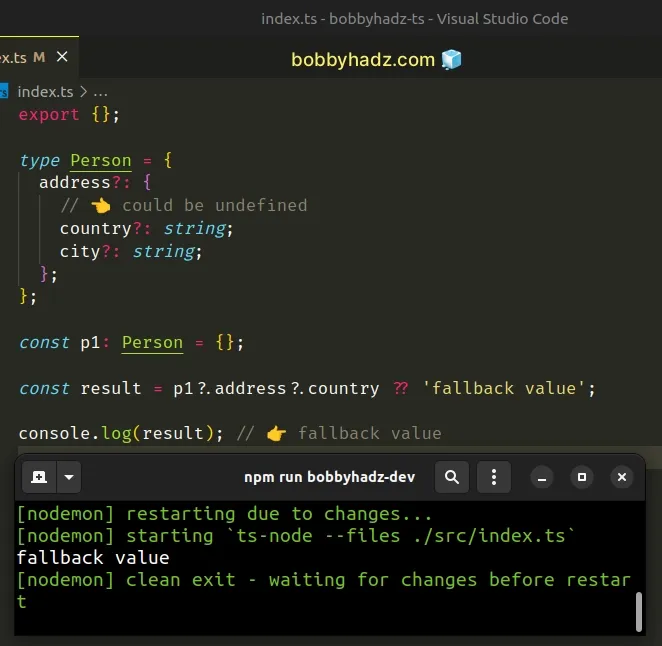
If the value to the left of the
nullish coalescing operator (??)
is equal to null or undefined, the value to the right is returned,
otherwise, the value to the left of the operator is returned.
If trying to access the nested country property on the object returns
undefined, then the value to the right of the nullish coalescing (??) operator
is returned.
# Using an if statement to solve the error
An alternative approach is to use a simple if statement as a
type guard.
type Person = { address?: { country?: string; city?: string; }; }; const p1: Person = {}; if (p1.address != undefined) { console.log(p1.address.country?.toUpperCase); console.log(p1.address.city?.toUpperCase); }
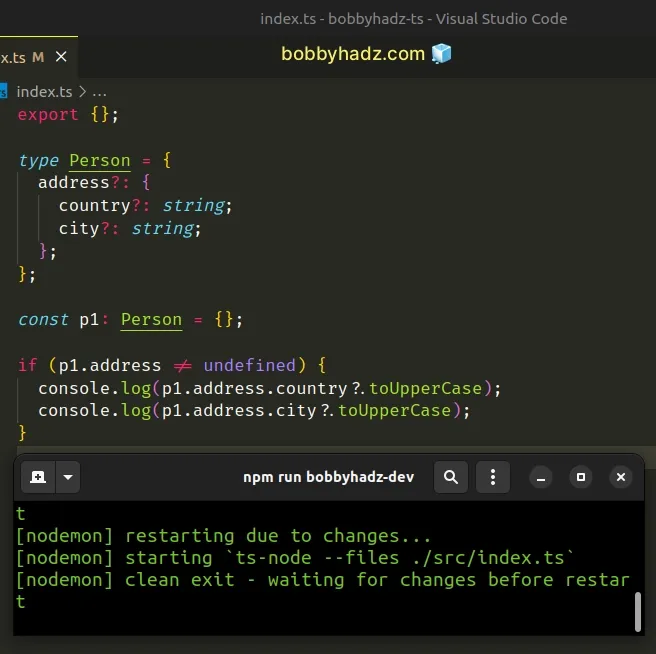
We used an if statement to check if the p1.address property is not equal to
undefined or null.
if block, TypeScript knows that the p1.address property is of type object, and not undefined.Notice that we used the loose inequality (!=) operator, which checks for both
undefined and null. You can exclusively check for undefined with strict
not equals (!==).
The loose comparison covers both undefined and null, because in a loose
comparison undefined is equal to null.
console.log(undefined == null); // 👉️ true console.log(undefined === null); // 👉️ false
# Using the non-null assertion operator to solve the error
If you are sure the property cannot possibly have a null value, you can use the non-null assertion operator.
type Person = { address?: { country?: string; city?: string; }; }; const p1: Person = { address: { country: 'Chile', city: 'Santiago', }, }; console.log(p1.address!.country); // 👉️ "Chile" console.log(p1.address!.city); // 👉️ "Santiago"
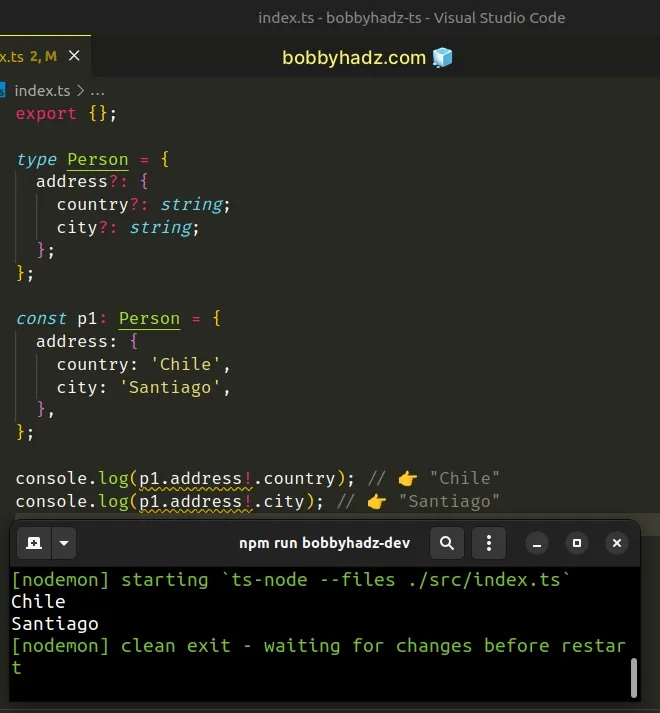
The exclamation mark is the non-null assertion operator in TypeScript.
null and undefined from a type without doing any explicit type-checking.When you use this approach, you basically tell TypeScript that this value will
never be null or undefined.
We used it right after the address property, so we are telling TypeScript that
p1.address will never have a value of null or undefined.
# Solve the error using the logical AND (&&) operator
If you are making a comparison in an if statement, use the logical AND (&&)
operator to make sure the property is of the correct type.
type Person = { address?: { country?: string; city?: string; num?: number; }; }; const p1: Person = {}; if ( p1?.address && typeof p1.address.num === 'number' && p1.address.num > 10 ) { console.log('success'); }
The logical AND (&&) operator makes sure the address property isn't
undefined, that num exists on the object and is a number before comparing
it to the number 10.
This is needed because if the reference is nullish (null or undefined), the
optional chaining operator (?.) will return undefined and TypeScript doesn't
allow us to compare undefined to a number.
For example, this would fail:
type Person = { address?: { country?: string; city?: string; num?: number; }; }; const p1: Person = {}; // ⛔️ Error: Object is possibly 'undefined'.ts(2532) if (p1?.address?.num > 10) { console.log('success'); }
The result might have a value of undefined because that's the return value of
the optional chaining (?.) operator when it short-circuits.
The num property might have a value of undefined, so we can't directly
compare it to a number.
Another common way to avoid getting the error is to use the logical AND (&&) operator.
type Person = { address?: { country?: string; city?: string; }; }; const p1: Person = {}; if (p1.address && p1.address.country) { // 👇️ const result: string const result = p1.address.country; }
undefined).All the values in the if condition have to be truthy for the if block to
run.
The falsy values in JavaScript are: undefined, null, false, 0, ""
(empty string), NaN (not a number).
All other values are truthy.
This is why TypeScript is able to infer the type of the result variable to be
string in the if block.
# Using the typeof operator to solve the error
An even better way to get around the error in this situation is to use the typeof operator.
type Person = { address?: { country?: string; city?: string; }; }; const p1: Person = {}; if (p1.address && typeof p1.address.country === 'string') { // 👇️ const result: string const result = p1.address.country; }
We explicitly check if the type of the country property is a string.
This is better than checking if the value is truthy because empty strings are
falsy values in JavaScript (and TypeScript).
Here is an example that illustrates why using the typeof operator is better.
type Person = { address?: { country?: string; city?: string; }; }; const p1: Person = { address: { country: '' } }; if (p1.address && p1.address.country) { // ⛔️ This doesn't run const result = p1.address.country; console.log(result); } else { // 👇️ this block runs console.log('✅ this runs'); }
This else block runs in the example above.
country property points to an empty string (falsy value), so just checking if the value is truthy might not be enough in your scenario.It's always better to be explicit and use the typeof operator when possible.
It helps us avoid some difficult-to-spot bugs.
# Conclusion
The "Object is possibly 'undefined'" error occurs when we try to access a
property on an object that may have a value of undefined.
To solve the error, use the optional chaining operator or a type guard to make
sure the reference is not undefined before accessing properties.
# Additional Resources
You can learn more about the related topics by checking out the following tutorials:

